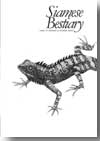| Our Publications | ||
| Books by Title | ||
| Books by Author | ||
| Books by Country | ||
| E-books | ||
| About | ||
| Orchid Press E-books | ||
| Distributed E-books | ||
| Our Bookshop | ||
| About Us | ||
| Browse Shop | ||
| How to Buy | ||
| Contact Us | ||
| WE BUY BOOKS AND LIBRARIES | ||
|
||
Book Reviews

Siamese Bestiary
written & illustrated byKristiaan Inwood
(1978) 2005 Second revised edition, index, 136 pp., 70 b & w drawings, 254 x 191 Softcover.
ISBN-10: 974-524-058-3 $23.00
ISBN-13 978974-524-058-2
Dreams of yesteryear
Book review by James Eckardt,
(The Nation, 29 May 2005)
The easygoing side of 1970s Thailand is revisited in this imaginative and hilarious work
KRISTIAAN INWOOD is that rare bird: a painter and a writer. Back in 1979, he published Siamese Bestiary, a handsome 136-page meditation on his life in a traditional wooden house on the rustic outskirts of Bangkok. Orchid Books has now republished it with additional material.
With meticulous attention to detail, Inwood drew exquisite sketches of his house, his wife Anong, his infant son Hilary and the bestiary that surrounded them. He sketches the tumbledown homes along a canal, a market woman paddling her sampan in a rainstorm, a tattooed neighbour and his fighting cock, a fortune teller with his paraphernalia, a wizened labourer cracking an egg into his breakfast lao kao.
His writing is just as luminous: prose, poems, low comedy; profiles of his neighbours, whimsical reflections. He tells us nothing about his past or his wife’s, except that she is the daughter of a farmer and doesn’t speak English. Here he sets the scene of his idyll:
“An old wooden house stands in the middle of the orchards. Trees crowd against a balcony girdling three sides of the house to bring insect chatter and birdsong through open windows. A dirt track drops from a road two hundred yards away, twists through overgrown trees, around a few scattered houses and many shallow ponds, like a frenzied snake, and abruptly stops a few yards beyond the house’s front gate. Perpetually widened by trampling feet and wooden ox-cart wheels, the original footpath either avoided long removed obstacles - a stream, large trees, houses - or was blazed by a capricious drunk.”
Inwood gets the idea for the book while he’s waiting for his wife to come home from the hospital with their newborn son. At the hospital he finds his wife looking radiant and his son “bright pink, screwing up his eyes against a bright outside world merely three mornings old. Take him into my arms and talk with Anong. As Anong and self gabble happy nonsense about everything and nothing, Hillary urinates into my breast pocket.” The book is baptised, blessed, fertilised, christened and launched.
“This is it.”
Next comes a wonderful chapter of pratfall comedy. Anong has gone to register the birth, leaving the author to cope with a screaming baby: “Coax, soothe, cradle, croon, desperately try to insert a milk bottle teat between his gaping jaws. No luck. Incredible screams. Fantastic lungs.
Anyone passing outside would think I am trying to strangle him.”
Inwood suffers from a pathological fear of snakes. When Anong informs him that she has just killed two snakes in the kitchen, Inwood falls into panicked reverie: “Move into a tenth floor apartment. Buy a mongoose. Better, buy a dozen. Emigrate to Ireland. Or New Zealand. Advertise for a suit of armour. Walk on stilts.”
Inwood’s life is mostly one of rustic tranquillity and whimsical musing. On the subject of his neighbourhood dogs, he writes:
“If the dogs share one characteristic, it must be that a disproportionate number are neurotic. Their standard diet - leftover rice, vegetables and meat scraps - and the incessant heat combines to weaken them and addle their brains. Imagine human beings having to And nourishment from equally unsuitable diets (dog biscuits, minced horsemeat and jaw-breaking bones) and wearing fur coats and hats in sweltering tropical weather, and you have a reasonable idea of local dogs’ physical and mental states.
“Their neuroticism takes many forms. For example, one particular dog, a black mongrel bitch, loveable and friendly was indubitably the Attest, ablest, swiftest and cleverest cat I’ve ever seen.”
Among her talents were catching birds, rats and snakes: “Too often would she approach strangers with the snake in her mouth, and mistaking their frenzied alarm for the start of a new game, pursue them pell-mell through the trees.”
Beyond the ever-present comedy, Inwood captures quotidian events in prose poems of simple but stunning lyricism: returning home at night in the rain, a morning walk with his son through the countryside, the daily rhythms of klong life.
He concludes a day of observing boat commuters, charcoal and noodle vendors, market women, schoolchildren, with a cold drink at a klongside restaurant where “the klong’s magic triumphed stealthily osmotically. Bougainvillaea appeared psychedelic against a cloudless sky. Children happily splashed in water nearby. Balmy Thai love songs softly escaped a radio. A passing vendor’s straw hat speckled sunlight across her wrinkled face, highlighting serenity and remnants of a formerly striking beauty. A butterfly sunbathed on a window sill.”
The book ends with Anong pregnant again and the little family happy in their wooden house. If you’re an expat who has lived happily in Thailand for a long time, give this book to a newcomer. It will explain why.
[Read another review from The Nation] [Read a review & excerpts from Bangkok Airways In-flight Magazine] [Read a review from The Bangkok Post] [More Orchid Press Reviews]
PO Box 70, Trinity TB, NL, A0C 2S0, Canada
Telephone: +1 709-330-4703